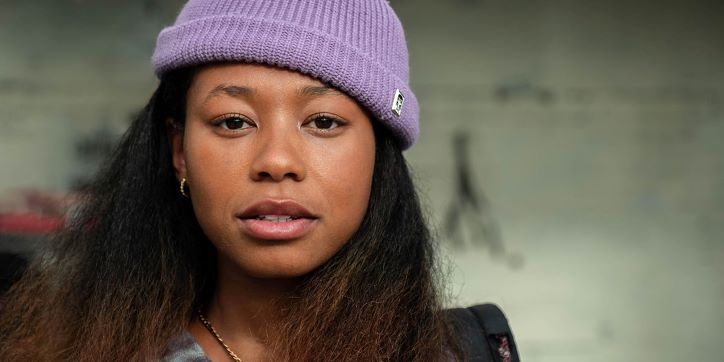On the Come Up is two things at one: a solid adaptation of its source material and an alright movie. Like Angie Thomas’s earlier YA novel, The Hate U Give (which was itself adapted in 2018), it’s about a young Black teen navigating a system too eager to view her as a dangerous stereotype. Besides racial profiling, a willfully skewed perception of what success means for artists of color is highlighted here. However successful the film translates these themes, its story always feels in need of extra room to allow consequences to have more impact, rather than to hear about them from second-hand sources.
Directed by Sanaa Lathan, On the Come Up’s world is one where words dominate. They shape opinions, offer meaningful acts of expression, and can even be used for brutal rap battle takedowns. For 16-year-old Brianna “Bri” Jackson (Jamila C. Gray, killing it in her debut movie role), words are her ticket to fame. An aspiring rapper, Bri’s life is divided between two worlds: playing word games in underground tournaments as Lil Law and attending classes with her friends Malik (Michael Cooper Jr.) and Sonny (Miles Gutierrez-Riley). Expectations loom over her identity on both fronts. In the ring, Bri is pursued by the shadow of her late father—a legendary singer killed by gang violence—and school is its own prison, thanks to two security guards who only seem interested in checking the non-White kids’ backpacks.
At home, Bri’s mom Jay (Lathan) tries to provide support despite being unemployed and a drug addict past her daughter hasn’t forgotten. Her aunt Pooh (Dolomite Is My Name’s Da’Vine Joy Randolph) manages Bri’s rap events, but is also—quite ironically—a drug dealer at odds with rival gangs. These two worlds soon come to blows. First by Bri getting body-slammed by a guard for perceived drug sales (it was just candy), then getting suspended for this act of violence she clearly didn’t start. Both incidents only augment Bri’s verbal anger and ingenuity, convincing her to join up with her dad’s former music partner, Supreme (Method Man), on a solo album.
Driving the story is the struggle to reject stereotypes vs. leaning into them. Bri’s song channels her everyday frustration by leaning into familiar media-catching anti-authority archetypes, only for its point to fly over everyone’s heads. All parents and administrators see is a “gangster” who instigates future problems at school with her words, rather than understand her words as a reaction to racism and stereotyping in everyday life.
As the movie reiterates, the profiling issue is all-encompassing and rife with consequences. In AA meetings, Jay reflects on how quickly job offers dry up when her addict past is acknowledged, as if she can’t be anything more than her past mistakes. Supreme, on the other hand, dresses the gangster part to sell merch because record producers and White audiences eat it up, and views this as the only way to succeed in his business. It’s an intriguing argument, but one hampered by pacing issues. The movie waits until its midpoint before Bri’s song is recorded and we hear its aftereffects. Emphasis on hear. For all Bri’s aunt, mom, and talking heads criticize the song for sending a false message, we never see how this message hurts Bri’s everyday life beyond a few conversations (and one tense standoff involving a loaded gun). The performances certainly carry On the Come Up’s weight, but its pacing less so.
The same goes for its presentation. Though Lathan affords the rap battle scenes a larger-than-life feel, her movie is shot pretty conventionally. Standard shot/reverse shot exchanges and set composition keep things proficient enough that you won’t get lost, yet not special enough to elevate the material. It gets the plot where it needs to go, but at a pace too candid to make the visuals match the dynamism.
On the Come Up’s strength is its characters. Watching Gray play off her co-stars Lathan and Randolph, you’ll believe these three share a history together, not all of it happy but clearly defined by tenderness and concern for each other’s well-being. As faithfully as Lathan brings its author’s vision to life, whether it’ll retain longevity—despite addressing themes that have only grown timelier since the book’s 2019 publication—remains something of a record scratch.

















Leave A Comment